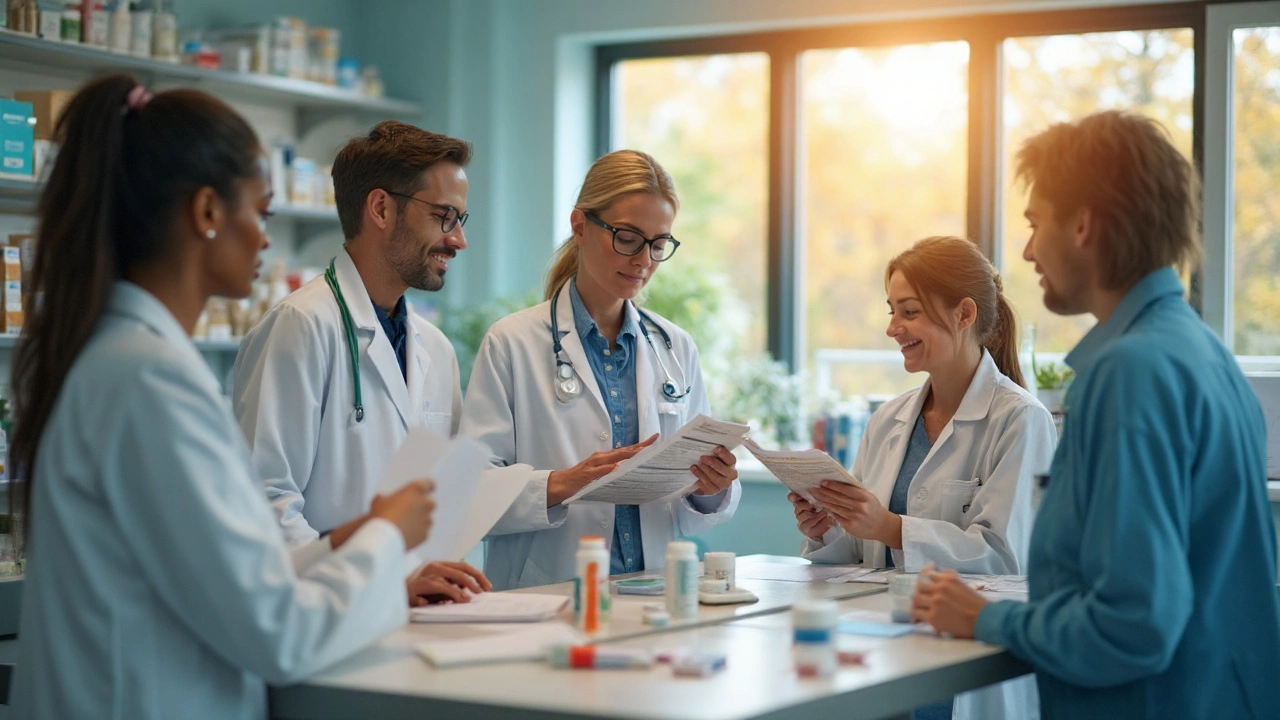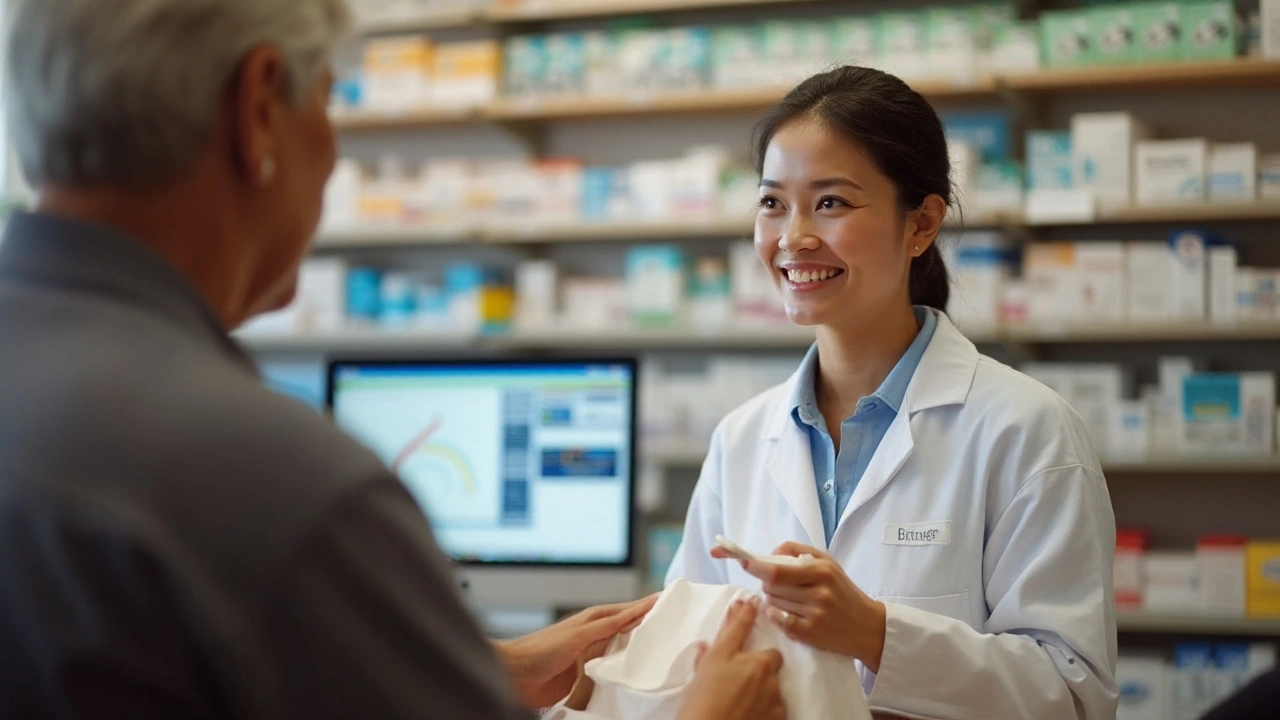If you think pharmacists just count pills and slap labels on brown bottles, you’re missing out on one of the best health resources out there. Every week, folks wander into pharmacies all over the world, clutching new prescriptions, confused about cold meds, or unsure if it’s okay to take that vitamin D with their blood pressure pill. Sometimes the stakes are even higher—one combo could put you in the ER. And yet, lots of people never even make eye contact with the person behind the counter, let alone ask them the important stuff. Why? Maybe they assume the advice will be generic. But pharmacists see the real-life side of medicine every single day, and their expertise might literally save your life.
The Critically Underrated Role of Pharmacists
Imagine you’re getting a medication for the first time. Maybe it’s for high cholesterol or an infection, or maybe you’re grabbing an over-the-counter allergy medicine. You already saw the doctor, right? Isn’t that enough? Here’s the thing: the doctor knows a ton, but the average general practitioner juggles about 20 patients per day and can’t possibly memorize every interaction between all possible medications on the market. Pharmacists not only learn this, they get daily experience catching real mistakes that slip through. According to the World Health Organization, at least 7% of hospital admissions are caused by adverse drug reactions, and half of those could have been prevented. Who’s on the front lines catching these? You guessed it: pharmacists.
There’s a classic story in pharmacy: someone comes in to pick up antibiotics and cough syrup. The pharmacist asks a couple of gentle questions and finds out the patient is also on blood thinners—a combo that could lead to internal bleeding if not flagged. Or think of the parent picking up aspirin for their feverish child, not realizing that giving aspirin to kids (especially with viral symptoms) risks something called Reye’s syndrome, a potentially fatal condition. Advice from a pharmacist isn’t just helpful—it can be lifesaving. In fact, a 2023 study from the Journal of Pharmacy Practice found that one in thirteen Americans had their medication mistake caught by a pharmacist before damage was done. That’s not just good luck; that’s expert intervention in action.
Of course, pharmacists do more than spot accidents. They watch for duplications, quantity errors, and signs something isn’t right—like someone repeatedly filling emergency medications, which could signal chronic issues or even abuse. They’re also trained to notice allergies and unexpected side effects. Even if you’re feeling shy, you can always ask discreet questions, and staff will never judge. Every question is important when it comes to your health.
Need a shot or a vaccination? These days, most pharmacists offer those services too, and they’re trained to do it safely and efficiently. In fact, since 2021, pharmacists in the US have played a huge role in providing COVID-19 vaccinations. They help people not just with immediate needs, but also with planning travel vaccines, timing flu shots, and managing yearly checkups for things like cholesterol and diabetes. That’s a lot more than just handing over pills.
Spotting Drug Interactions and Mistakes Before They Happen
You might think all those warning stickers on your medication—"Do not operate heavy machinery," "Take with food"—are enough. But drug interactions are way more complex. Did you know grapefruit can dangerously boost levels of certain blood pressure drugs? Or that some antacids make antibiotics almost useless? A pharmacist can look over your medication list, dig up hidden interactions, and explain them in plain English. Not everyone knows, for instance, that St. John's Wort—an herbal remedy for mood—is notorious for messing with birth control, antidepressants, and heart meds. This is the sort of thing you only find out if you ask someone in the know.
Here’s where the art of pharmacy really shines: they consider the whole picture. Maybe you’re taking several drugs from different doctors who don’t talk to each other. Maybe you’ve added supplements, or your eating habits just changed. Even a holiday trip and a new sunscreen could change how your medicine works (yes, sunlight really can matter with certain antibiotics). Wondering if you need something at all? There’s a chance your pharmacist will recommend a non-drug solution first, like saltwater rinses for a mild sore throat instead of rushing to antibiotics.
Checking for duplicate therapies is another big one. Sometimes older adults end up with different brand names of the same drug and take both. This “double dipping” can be dangerous, like taking two types of antihistamines and ending up with heart palpitations. Or folks on “water pills” for blood pressure who don’t know that a decongestant could crank their blood pressure up, risking a stroke. Pharmacists use special software to scan for these risks, but most will recognize common red flags right away, long before a computer alert pops up.
If you’re using over-the-counter meds, that’s often the wild west. The label has small print and the internet is full of horror stories, but a two-minute conversation at the pharmacy can clear up confusion. Don’t feel embarrassed—it’s literally their job to explain that you can’t combine ibuprofen with certain blood pressure meds, or that you should drink a full glass of water with potassium supplements to avoid stomach trouble. And when in doubt about how to fit a new med into your morning routine, a pharmacist can help draw up a schedule, so you’re less likely to miss a dose or double up by accident.
| Common Drug Interactions Caught by Pharmacists | Potential Harm |
|---|---|
| Blood thinners + NSAIDs (e.g., ibuprofen) | Risk of serious bleeding |
| ACE inhibitors + potassium supplements | Dangerous rise in potassium levels |
| Statins + grapefruit juice | Muscle toxicity, liver damage |
| Antibiotics + oral contraceptives | Reduced birth control effectiveness |
| Warfarin + leafy greens (vitamin K) | Reduced blood thinner effect |

The Personal Side: Advice You Won’t Find Online
Maybe you’re used to searching symptoms on Google or asking in Facebook groups, but there’s a lot those can miss or get wrong. Research by Pew in 2024 found that over 60% of Americans had used the internet to diagnose themselves in the last year. However, only 12% said they felt “very confident” in their findings afterward. That little bit of uncertainty? It can stop you from getting the help you need. Pharmacists do more than just explain textbook side effects—they ask about your personal risks. Got trouble swallowing pills? They might recommend a liquid version or a slow-release tablet that’s easier to take. Worried about costs or insurance hang-ups? They know the tricks to get generic versions or find manufacturer discounts.
They’re also fantastic at reality checks. Maybe you’ve heard taking vitamin C cures all colds, or that antibiotics are needed for every sore throat. A good pharmacist will gently let you know when you actually don’t need medicine at all, saving you from side effects, resistance, or wasted money. They’ll warn you away from sketchy supplement brands, recommend trusted over-the-counter picks, and remind you to keep a complete meds list—super key for emergencies or new doctor visits.
Privacy is also a huge perk. Pharmacists are trained to have tough, confidential conversations all the time. Whether it’s about sexual health, mental health, or questions about addiction, you can ask away without worrying your personal details will spread throughout the neighborhood. Some pharmacies even have private counseling rooms for sensitive topics. Every question matters, and there’s no such thing as “too small” when your health is at stake.
Here’s a quick tip: bring your current med list (with doses and schedules) whenever you see your pharmacist—especially if you’re starting something new. This could be a handwritten note, a picture on your phone, or a printed chart. It helps your pharmacist quickly double-check for problems or suggest helpful adjustments. For kids or elderly family members, having an updated meds list is a total game changer, especially in emergencies.
Getting the Most from Your Pharmacy Visit
Don’t just wait at the counter with your head buried in your phone the next time you head to the pharmacy. The best questions start with what you actually want to know—not what you think you “should” ask. Unsure when to take your meds? Ask if morning or evening is better, since some pills can keep you up at night, while others might cause dizziness. Troubled by side effects? Don’t be shy—many common issues can be fixed by switching brands, changing timing, or adding food. If your insurance company denies a medication, ask about alternatives; often, pharmacists know about special programs that can help cover costs or find something comparable for less money.
And don’t assume “natural” means “safe.” Herbal supplements, teas, vitamins—all can cause big problems if combined with prescription meds. Always run them by your pharmacist, especially if you’re thinking about mixing multiple remedies. Pharmacists regularly attend continuing education classes, so their advice is fresh and based on the latest science—not just rumor.
Vaccinations, travel meds, smoking cessation support, home care equipment—today’s pharmacists do all these and more. If you need a blood sugar monitor, a blood pressure cuff, or custom packaging for a complicated list of pills, just ask. They can even teach you how to use inhalers, insulin pens, or nasal sprays correctly; the difference between theoretical and real-world use is huge, and the right instruction avoids so many headaches.
If you’re managing chronic conditions (like diabetes or asthma), pharmacists are your secret weapon. Regular check-ins at the pharmacy can catch issues between doctor visits, keep you motivated to stick to your treatment plan, and alert you when something’s off. Need help remembering to take your pills? Ask about synchronization programs, blister packs, or reminder apps—most modern pharmacies have solutions built in.
- Keep an up-to-date medication list with dosages and timing.
- Ask your pharmacist about new symptoms or side effects before making changes.
- Bring all your regular and over-the-counter meds to your pharmacy check-up.
- Don’t feel rushed—good pharmacists always make time to address your concerns.
- Ask about generic options to manage costs without sacrificing quality.
- Clarify instructions if anything seems confusing; it’s their job to help you understand.
- If you experience unusual side effects, report them—your feedback might help others avoid trouble.
So the next time you pick up a prescription, think of it as a chance to get real, personalized guidance. Pharmacist advice isn’t just convenient—it’s one of the easiest ways to take control of your health, get the most out of your medicines, and avoid mistakes that could turn into major problems down the road. Next time, instead of skipping the chat at the counter, pull up a question and make the most of their expertise. You might be surprised at just how much you learn—and how much safer you’ll feel with a pro in your corner.

